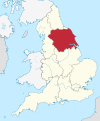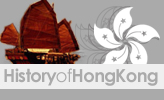
The history of bus transport in Hong Kong began with the introduction of the first bus routes in Hong Kong in the 1920s.

The China Motor Bus Company, Limited, often abbreviated as CMB, is a property developer based in Hong Kong. Before its busfranchise lapsed in 1998, it was the first motor bus operator in Hong Kong, and was responsible for the introduction of the iconic double-decker buses to Hong Kong Island. Currently CMB does not run any transport services and has since shifted into property development as an alternative means of profit.

London General Transport Services Limited, trading as Go-Ahead London, is a bus company operating in Greater London. The London General brand is a subsidiary of Go-Ahead London and operates services under contract to Transport for London. The company is named after the London General Omnibus Company, the principal operator of buses in London between 1855 and 1933.

The MCW Metrobus is a two and three-axle double-decker bus manufactured by Metro Cammell Weymann (MCW) between 1977 and 1989, with over 4,000 built. The original MkI was superseded by the MkII which had a symmetrical windscreen with an arched top in 1981, although production of the original MkI continued for the Greater Manchester Passenger Transport Executive and London Regional Transport until 1983 and 1985 respectively. The Metrobus was conceived as an integral product manufactured completely by MCW, but Alexander and Northern Counties also bodied some examples.
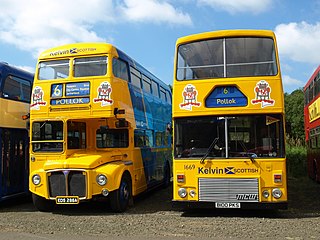
Kelvin Scottish Omnibuses Ltd was a bus operating subsidiary of the Scottish Transport Group based in Bishopbriggs, Strathclyde, Scotland. It was formed in March 1985 from parts of Walter Alexander & Sons (Midland) Ltd and Central SMT, initially with six depots and a varied fleet of 381 vehicles.
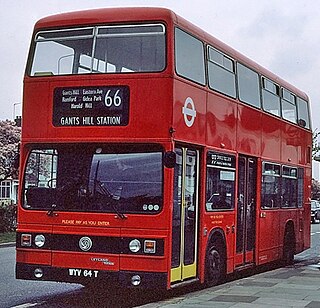
The Leyland B15 Titan is a rear-engined double-decker bus manufactured by Leyland between 1977 and 1984, primarily for London Transport.

Metro is the passenger information brand used by the West Yorkshire Combined Authority in England. It was formed on 1 April 1974 as the West Yorkshire Passenger Transport Executive (WYPTE), at the same time as the metropolitan county of West Yorkshire. The Metro brand has been used from the outset and, since the formal abolition of the WYPTE on 1 April 2014, it has remained the brand name of public transport in the region, overseen by the West Yorkshire Combined Authority, which is also responsible for the delivery of transport policies.

Metro Cammell Weymann Ltd. (MCW) was a British bus manufacturer and bus body builder based at Washwood Heath in Birmingham, England. MCW was established in 1932 by Metro-Cammell's bus bodybuilding division and Weymann Motor Bodies to produce bus bodies.

Arriva London is a major bus company operating services in Greater London. It is a subsidiary of Arriva UK Bus and operates services under contract to Transport for London. It was formed in 1998 from a fusion of previously separate Arriva subsidiaries Grey-Green, Leaside Buses, Kentish Bus, London & Country and South London Transport. Operations are split between two registered companies, Arriva London North Limited and Arriva London South Limited.

Sullivan Bus & Coach Limited, trading as Sullivan Buses, is a bus company based in South Mimms, Hertfordshire, England. Founded in 1998, it operates local bus services in and around Hertfordshire including school services, rail replacement bus services near London, bus links in Surrey to and from Thorpe Park and vehicle hire for television programmes.

RATP Dev Transit London Limited, trading as RATP Dev Transit London, is a bus company in North London. The London Sovereign brand is a subsidiary of RATP Dev Transit London and operates buses under contract to Transport for London.
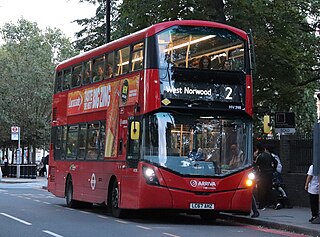
London Buses route 2 is a Transport for London contracted bus route in London, England. Running between Norwood bus garage and Marylebone station, it is operated by Arriva London.

McKindless was a Scottish bus operator, operating a number of bus routes throughout Greater Glasgow, Scotland. The company was based in Newmains and had a depot in Parkhead.

Maidstone & District Motor Services was a bus company based in Maidstone, Kent. The company operated bus and coach services in Mid and West Kent and East Sussex from 1911 until 1998. The company's surviving operations were absorbed into Arriva Southern Counties.

The East Kent Road Car Company Ltd is a bus company formed in 1916 and based in Canterbury, Kent. The company operated bus and coach services in Kent. In 1993 it was one of the first companies to be acquired by the Stagecoach Group, which eventually rebranded the operation as Stagecoach in East Kent, and made it part of the Stagecoach South East bus division.

London Buses route 65 is a Transport for London contracted bus route in London, England. Running between Ealing Broadway station and Kingston upon Thames, it is operated by RATP Dev Transit London.

Ensign Bus Company Limited, trading as Ensignbus, is a bus and coach operator and bus dealer based in Purfleet, Essex. As of March 2023, it is a part of FirstGroup.

Glenvale Transport (GTL) was a bus company that operated services in Liverpool between July 2001 and July 2005.

London Traveller was a bus operator in London in the late 1990s and early 2000s. It was partially owned by Yorkshire Traction, and was sold to Thorpes in October 2001.
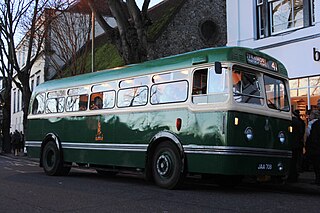
The Leyland-MCW Olympic was an underfloor-engined single-deck bus manufactured for at least eighteen countries from 1949 to 1971. 3,564 Olympics were built at four factories from 1949 to 1971, with 1,299 Olympics (36%) built as right hand drive and 2,265 (64%) as left hand drive. It was a very durable heavy-duty bus which ran in arduous conditions for longer periods than ever envisaged by its designers.





















